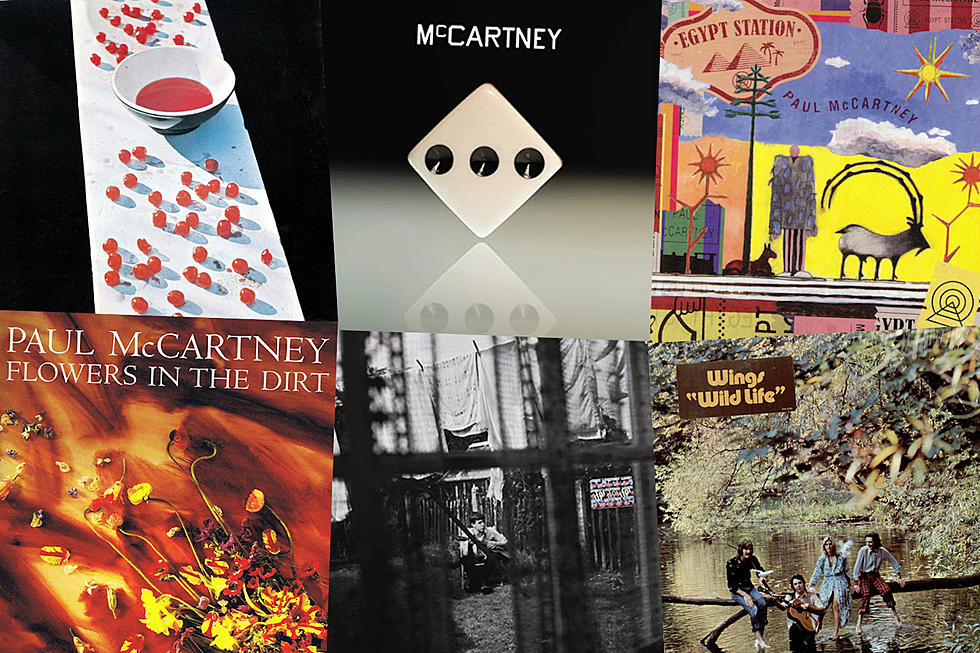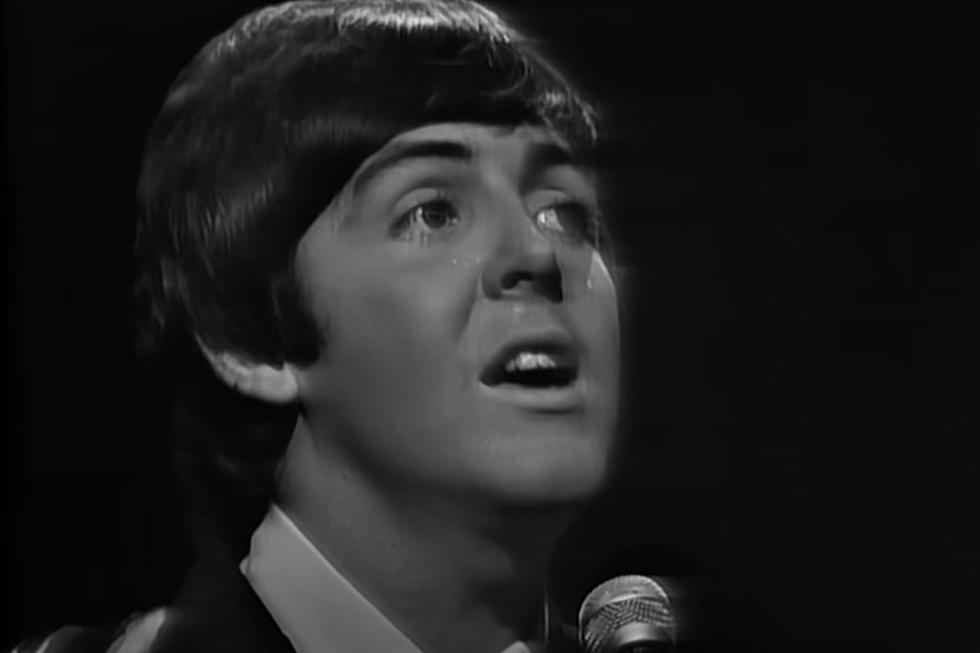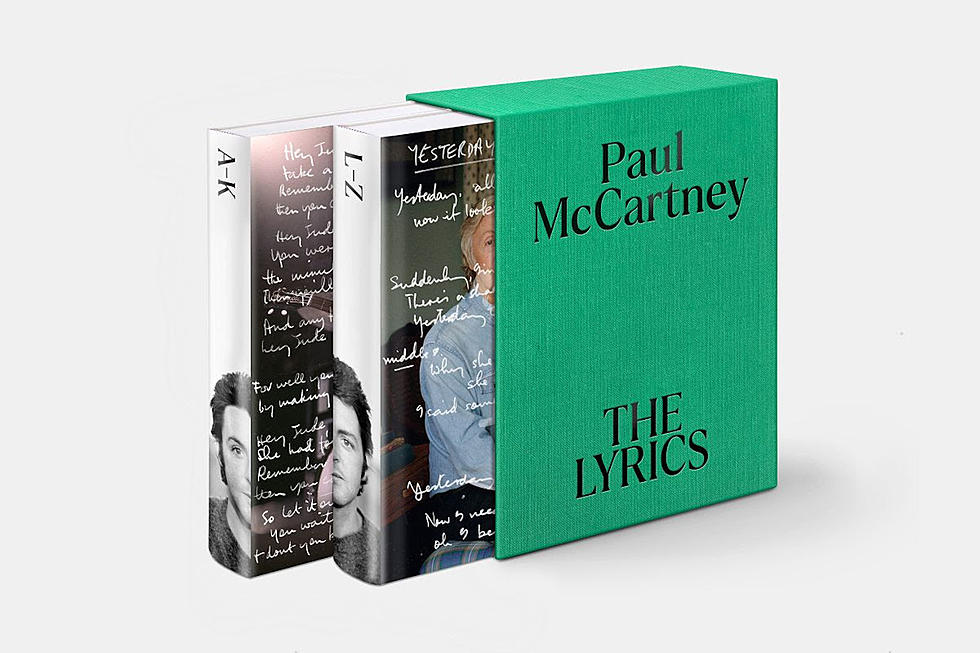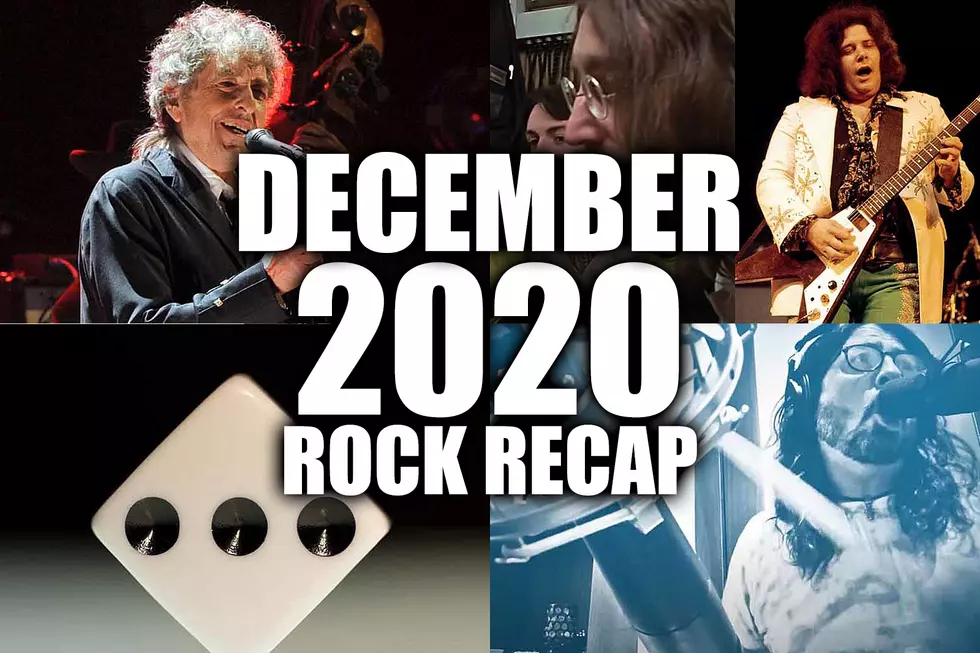
Paul McCartney: Last Great, Last Good, First Bad Album Roundtable
If Paul McCartney had decided he was done with music following the disbandment of the Beatles, he still would have gone down in history as one of music’s greatest songwriters.
Of course, Sir Paul didn’t hang ‘em up - far from it. Instead, the former Beatle set forth on one of the most prolific solo careers in rock.
Be it alongside Wings, with his wife Linda or in pure one-man-band situations, McCartney has created some truly timeless releases. Of course, no artist is perfect. And across his 50 solo run, Macca has mixed in his share of head-scratching decisions and outright duds.
Below, five UCR contributors debate Paul McCartney’s last great, last good and first bad albums.
1. What was the last great Paul McCartney album, and why?
Michael Gallucci: Chaos and Creation in the Backyard - The 2005 album got McCartney out of his comfort zone for the first time in decades. He performed most of the album himself, after years of relying on studio professionals, and handed over the project to a producer for the first time in 20 years. Nigel Godrich, best known for his work with Radiohead, led McCartney to his most self-reflective and personal-sounding record since 1982's Tug of War (though 1997's Flaming Pie comes close).
Ryan Reed: Chaos and Creation in the Backyard. It feels like the last time McCartney pushed himself to experiment (courtesy of longtime Radiohead producer Nigel Godrich) and prioritize art over the pursuit of a hit single. Songs like the dreamy, string-soaked "Riding to Vanity Fair" and fingerpicked folk ballad "Jenny Wren" (featuring a breathtaking solo on the duduk, a Armenian woodwind instrument) sound meticulously arranged in a way most of his post-Beatles work never was. Plus, he still wound up with that perfect pop single: the clanging piano-rocker "Fine Line."
Nick DeRiso: 2005’s Chaos and Creation in the Backyard. A typically winking McCartney made his most serious and unfussy LP ever with Chaos and Creation, an album that only grows into a richer experience with subsequent listens. The result is not only a third-act success; it's one of McCartney's very best albums of any era.
Allison Rapp: Flowers in the Dirt. Both McCartney and Elvis Costello seemed to be just at the right point in their careers for a collaboration of that kind, and I love that you can still recognize elements of each musician's personal style, while still making something that feels cohesive. The two of them didn't always get along during the process, but frankly those discrepancies may have worked in the record's favor -- it made it more genuine. There will never be another John Lennon, but by teaming up with Costello, McCartney was once again working alongside a similarly evocative mind with a vivid imagination. It paid off.
Corey Irwin: I'll go with Egypt Station, though McCartney III came awfully close. On Egypt, Macca struck the perfect balance between the sound we all expect from him and his desire to continually experiment. Lyrical topics ranged from drug use ("Happy With You") to politics ("Despite Repeated Warnings"), a still every track fit naturally in the pseudo-concept album framework. Egypt Station was a complete effort from front-to-back, and easily his first "great" work in over a decade.
2. What was the last good Paul McCartney album, and why?
Gallucci: Egypt Station (2018) was just weird and accessible enough to sound like a modern-day version of 1971's Ram. McCartney is beyond the point where he's going to release a truly experimental work (at least under his own name), but Egypt Station takes way more risks than most artists of McCartney's age and stature do. But for every interesting song here, there's another one that doesn't really go anywhere.
Reed: McCartney III, his 18th solo LP, isn't a career highlight. But how many songwriters have released albums this good at age 78? Revisiting the semi-ramshackle one-man-band approach of his first two self-titled albums, McCartney's quarantine project feels charmingly haphazard — the sound of a musical giant tabling his chart ambitions to just screw around and have some fun. Luckily, no one's goofing off sounds better, from the "Blackbird"-like fingerpicking of "The Kiss of Venus" to the hand-crafted psych-pop of "Seize the Day."
DeRiso: 2007’s Memory Almost Full. A terrific blending of elements from the breadth of McCartney's varied career, this LP has only gotten better with age. At the same time, "The End of the End" made clear the more troubling themes at play, as McCartney's then-recent divorce finally seemed to send him into more contemplative territory. Welcome, indeed.
Rapp: I quite like Flaming Pie, but I can also recognize the aspects that keep it from being great. If there is such a thing as too much Jeff Lynne, maybe this is it? Even apart from that, it's a really busy album with a lot going on. Better be prepared to keep up.
Irwin: I’m not sure why I had low expectations for McCartney III - maybe the pandemic turned me into a pessimist. In any case, the album totally blew me away. Opener “Long Tailed Winter Bird” offered one of the album’s most hypnotic riffs, while “Find My Way” was so damn catchy I found myself unintentionally singing it while going about my daily life. McCartney III really had a little bit of everything. Want some blues-rock swagger? Here’s “Lavatory Lil.” Need some tender romance? Enjoy “The Kiss of Venus.” Just a really solid effort through and through.
3. What was Paul McCartney’s first bad album, and why?
Gallucci: All of the Beatles used their first albums to basically declare they weren't just Beatles: John Lennon made a series of unlistenable noise-collage messes with Yoko Ono, George Harrison waded into world music for a soundtrack LP and Ringo Starr revisited his childhood with a record of standards. McCartney used his self-titled 1970 debut solo album as a one-man, DIY dive into his studio. Too bad he forgot to write memorable songs for it. "Maybe I'm Amazed" is good, though.
Reed: Down-home roughness and simplicity worked just fine on McCartney's debut solo LP, largely because he had hooks to balance it all out. The first Wings album, Wild Life, is similarly lo-fi, but the melodies aren't there. It's one of the few Macca-related albums where almost nothing works: The vibe is flat from start to finish, like you're listening in on a band's first jam session before they'd settled on any memorable riffs or words. Luckily, the dude had another song or two up his sleeve.
DeRiso: It didn’t take long – 1971’s Wild Life. Perhaps in an attempt to replicate the bucolic scene found on its cover, Wild Life marks a decidedly unambitious debut for Wings, one of the era's biggest hitmakers. These songs sound too cute by half, and the other half are taking the day off.
Rapp: For me it's probably Back to the Egg. London Town didn't do McCartney any favors either, but I wish he had taken a step back after that to regroup, consider what he wanted his sound to be on the next album and zero in on how to bounce back. Instead he adopted more of a "throw anything at the wall and see what sticks" process and clearly, that didn't work out very well.
Irwin: Wild Life. Maybe he felt pressure in being part of a band for the first time since the Beatles' demise. Maybe his heart wasn't initial as committed to the endeavor as it needed to be. Whatever the reason, McCartney's first effort with Wings was simply uninspired. The songs aren't inherently "bad," as much as they're forgettable.
4. Which Paul McCartney album just missed being good, and why?
Gallucci: Flowers in the Dirt had the makings of a pretty good album. McCartney was coming off creative and commercial disappointments, so he didn't rush the sessions that yielded the 1989 album. He worked with a number of different producers and cowrote a bunch of songs with Elvis Costello. But somewhere along the way all those good intentions turned into a mostly dull, super-cluttered and overly polished work with just a handful of good songs.
Reed: Wings at the Speed of Sound, even if there are some massive clunkers on there. The standard critic summary is that Wings fifth album was a failed experiment in democracy — at showing they were more than McCartney, his wife and some hired hands. That's not 100 percent fair: Denny Laine's simmering rocker "Time to Hide" is one of the record's sturdiest tracks. But there's a slapped-together vibe to the whole affair, and it's hard to justify a lead vocal for anyone not named Paul McCartney. Regardless, they wound up with two transcendent (if admittedly lightweight) pop-rock staples: "Silly Love Songs" and "Let Me In."
DeRiso: 1982’s Tug of War. Overpraised at the time by a fan base still reeling from the murder of John Lennon, Tug of War can now be seen as a noble failure. McCartney ditched Wings in favor of a kitchen-sink approach to music-making, and that new freedom led to a decidedly unfocused outcome.
Rapp: Driving Rain stands out to me as this transitional type album that has a lot of really wonderful traits to it (McCartney's bass playing, the string arrangements), but at the same time is a little hard to wrap one's head around. I'm not sure if he ran out of time, but there are some tracks that don't feel finished or, at least, aren't on par with the rest of the album.
Irwin: Memory Almost Full was a fine release, but it could have been so much more. McCartney took a decidedly nostalgic approach to the 2007 LP, delving into everything from his childhood to his then-recent divorce for lyrical inspiration. Such a method is certainly captivating - and in the hands of one of the world’s greatest songwriters, a reason for fans to be excited. Still, the end result felt like Sir. Paul only partially committed to the exercise. While “The End of the End” and “Mr. Bellamy” were clear highlights, “Dance Tonight” was formulaic (with a downright grating chorus). Memory could have been a triumph, but instead landed somewhere in the “simply decent” range.
5. Do you think Paul McCartney could make a great album again? Why or why not, and what would it take?
Gallucci: I think he has it in him to make a "great" album the way Bob Dylan has in his late career. Will it be as great as Ram or Band on the Run? No, just as Modern Times isn't Blonde on Blonde. But it's possible if McCartney abandons whatever commercial aspirations he seems to inherently toss into all of his records and go full-on with Ram-like musical zigzags, there could certainly be another album worthy of his legend and legacy.
Reed: He's made a lot of solid albums in the last decade — you could put together a strong compilation from the highlights of New, Egypt Station and McCartney III. And that's good enough for McCartney, a songwriter who's given more to popular music in the last century than anyone else. I think his best shot at a great album would come from a change in his production team — it's no coincidence that Godrich, one of rock's few modern production geniuses, threw up the alley oop for his last slam dunk.
DeRiso: Yes. The truth is, McCartney has been in the midst of a small very-late-career renaissance for years. None of his most recent LPs has been an embarrassment – even his solo-recorded lockdown project McCartney III, which had every right to be – and some of them have been quite good.
Rapp: Categorizing McCartney albums feels exceptionally difficult because, in my mind, there are at least half a dozen creative versions of him, all of whom have made entirely different music over the years, but yes, I do think he has it in him. I think it may take a sort of Bob Dylan, Rough and Rowdy Ways-style approach in which he takes his time writing and then quietly brings together a handful of top session musicians. No big fanfare, no fancy collaborations, just McCartney patiently doing what he does best.
Irwin: I mean, hasn’t he already proven he can? His last two albums have been very good additions to his already unrivaled legacy. He’s always willing to add new experimentation onto his traditional sound, meaning we very rarely get songs which feel like retreads of earlier work. He also remains extremely willing to learn new tricks - as evidenced by his work alongside younger, modern artists. Is there another rocker, pushing 80, who’s still willing and able to create such worthy new material? If so, that’s a mighty short list.
Paul McCartney Albums Ranked
More From KLTD-FM










